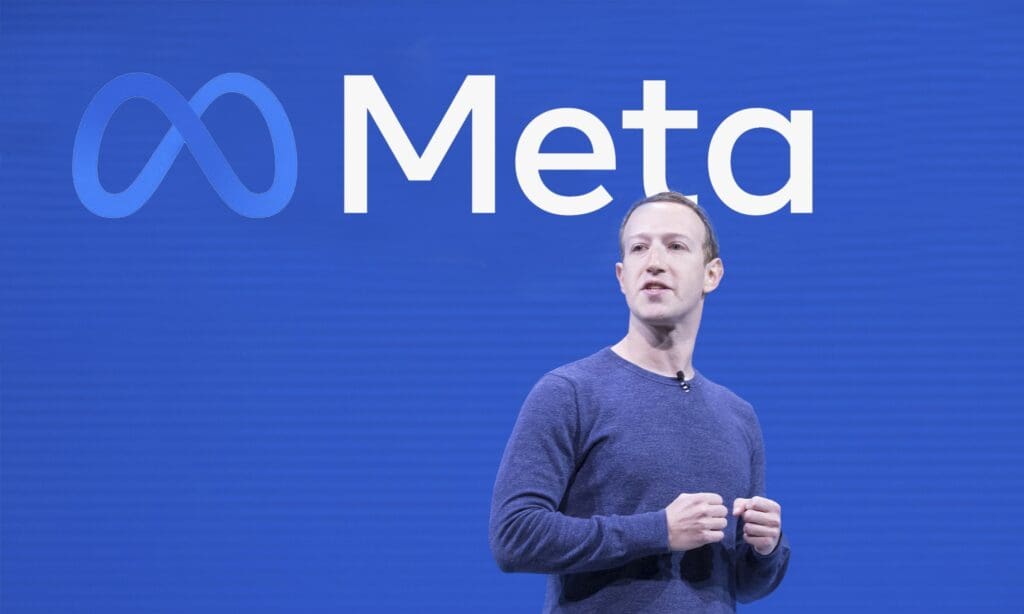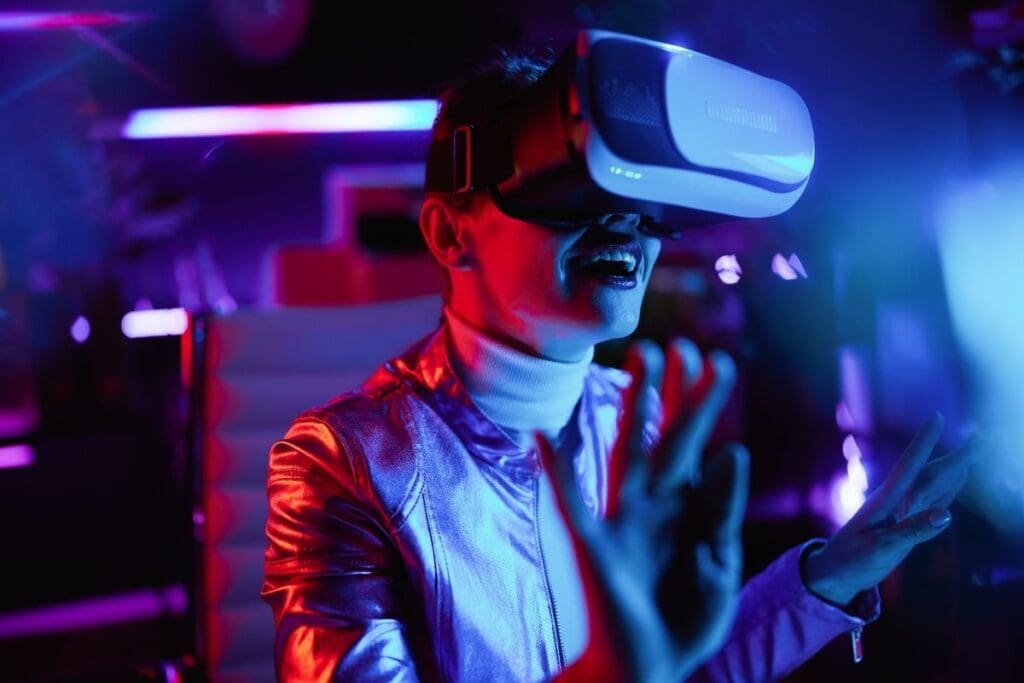Can we transfer our lives right into a digital universe? Questioning the course of the metaverse—which can form our future—and the risks it could pose is of nice significance!
The metaverse (lit. “past‑universe”) is a community of constantly open digital environments the place many individuals can work together with each other and with digital objects by their very own digital representations, i.e., avatars. You possibly can consider the metaverse as a mix of immersive digital actuality, a massively multiplayer on-line function‑taking part in sport, and the online. It has three core points: presence, interoperability, and standardization.
- Presence is the sensation of embodiment—being in the identical digital area with different people. This sense of presence is understood to enhance the standard of on-line interactions and is achieved by VR applied sciences equivalent to head‑mounted shows.
- Interoperability is the seamless journey between digital areas that share the identical digital property, equivalent to avatars and digital objects.
- Standardization is what makes the platforms and companies throughout the metaverse interoperable. As with each mass‑communication know-how from the printing press to messaging apps, widespread adoption of the metaverse requires frequent technical requirements. Worldwide our bodies just like the Open Metaverse Interoperability Group outline these requirements.
The Historic Highway to the Metaverse

For the previous 30 years we’ve witnessed a rare technological revolution: the development of a person‑made, digital universe. It started within the twentieth century with transistors, computer systems, and the web. Commerce, communication, and social relations—all human actions—began transferring from the true to the digital. For instance, we now not go to the bazaar; with just a few clicks we purchase what we would like. We now not wait months to contact distant mates; we speak immediately. Our music, films, and video games at the moment are in our pockets, not within the bodily world.
Whereas we’ve been severing our ties with the bodily realm, the tech revolution has pressed on: monumental strides have been made in CPUs, GPUs, knowledge processing, machine studying, synthetic intelligence, and cryptography. By the 2010s these advances opened the door to even greater‑stage concepts. Blockchain know-how, for example, made it potential to course of knowledge securely with out central authority. Its hottest utility is cryptocurrencies, however the identical tech may be utilized anyplace we don’t need energy centralized and the place privateness issues—digital identities, authorities, healthcare, insurance coverage, legislation, and extra.
Discover the frequent thread: digitizing bodily‑world processes and interactions. These developments had been all progressing, but how seemingly unbiased applied sciences would join was unclear—till the idea of the metaverse emerged.
The Science‑Fiction Historical past of the Metaverse

The metaverse isn’t a brand new idea. It was first expressed in Neal Stephenson’s 1992 dystopian sci‑fi novel Snow Crash, although the concept was popularized earlier as “our on-line world” in William Gibson’s 1984 novel Neuromancer.
In Snow Crash the time period metaverse means precisely what it does right this moment: a digital actuality the place people can work together with one another and their environment in three‑dimensional bodily area by way of varied digital applied sciences. Many years in the past Stephenson foresaw the metaverse because the successor to the web and described it as follows:
“[Hiro Protagonist] isn’t assembly actual folks, in fact. They’re all a part of the transferring image his pc attracts based on the specs coming down the fiber‑optic cable. Persons are items of software program known as avatars. [Avatars] are the audio‑visible our bodies folks use to speak with one another within the Metaverse. Hiro’s avatar is now on the road, and {couples} getting off the monorail can see him simply as he can see them. These folks—most likely 4 youngsters on a sofa in a Chicago suburb—may strike up a dialog with Hiro in Los Angeles. However they most likely wouldn’t say way more to one another than they might in actual life.”
Since then the metaverse has appeared in movies, books, and collection from Avatar to Prepared Participant One, Otherland, Altered Carbon, and even The Matrix. The 2018 sci‑fi movie Prepared Participant One, based mostly on Ernest Cline’s 2011 novel, portrays the metaverse because the inheritor to the web: a younger orphaned hero escapes his bleak actuality by getting into a wondrous digital universe known as the “OASIS” by a headset and bodily interacting in three dimensions.
The Etymology of the Time period “Metaverse”

Stephenson doubtless selected the prefix meta‑ as a result of it has each a longtime which means and a more moderen one taking root in pc‑science tradition. In historic Greek meta means “after” or “past.” Metaphysics is that which is “past physics.” Your metatarsal bones are past (after) the tarsals of the mid‑foot. Metamorphosis means taking a type past the present one.
The phrase gained a technical connotation with the emergence of Lisp programming in 1958—partly because of its help for metaprogramming (applications that modify themselves at runtime). Keyboards for Lisp programmers even had a Meta key.
Ten years later John Lilly utilized metaprogramming to folks in Programming and Metaprogramming within the Human Biocomputer—a e book Timothy Leary as soon as known as “one of many three most vital concepts of the twentieth century.” The e book argued that the environment frequently “applications” us, and LSD experiments may permit us to alter our personal applications.
In 1979 Douglas Hofstadter’s Gödel, Escher, Bach: An Everlasting Golden Braid entrenched meta’s self‑referential which means in geek tradition—meta‑sport (a sport concerning the sport), meta‑studying (studying about studying), meta‑cognition (fascinated with considering), metadata (knowledge about knowledge), HTML meta tags (details about an online web page’s content material), and so forth.
Thus metaverse can be considered a “(digital) universe concerning the universe.”
Stephenson doubtless envisioned the metaverse as a mix of “a universe past our personal” and meta’s self‑referential sense in geek tradition. Since he first used the time period within the early ’90s, the phrase has developed to embrace each meanings: self‑reference and one other airplane of actuality.
The Technological Historical past of the Metaverse

The metaverse has begun to step out of science fiction and into tangible tech. In a July 2021 interview with The Verge, Fb CEO Mark Zuckerberg stated:
“Throughout the subsequent 5 years I believe folks will see us not as a social‑media firm, however as a metaverse firm.”
Simply three months later, on the finish of October 2021, the almost one‑trillion‑greenback agency renamed itself Meta—an try to flee mounting authorized troubles and PR crises, but additionally the fruits of a strategic pivot brewing since no less than 2015.
Many specialists consider that within the not‑too‑distant future digital actuality will change into a significant a part of our lives. We could spend a lot of our time in an enormous digital universe stuffed with numerous digital areas that really feel actual. That universe is what we name the metaverse.
What Is the Core Logic of the Metaverse?

Put merely, the aim is to show every part housed on right this moment’s 2‑D web—or something in our lives that may be digitized—into 3‑D and transfer it right into a shared digital universe.
Throughout Fb Join 2021, Zuckerberg painted such a future.[5] Think about watching a YouTube video right this moment: you passively view it on a flat display screen. In a “YouTube metaverse,” nevertheless, Evrim Ağacı (or any creator) would stand on a customized digital stage; you, carrying VR goggles, can be there beside us. You possibly can work together each with us and with different viewers in actual time—asking questions immediately relatively than typing feedback. If we wished, the Q&A may even happen in a digital café modeled after Mars.
Metaverses don’t have to duplicate Earth; they are often solely imagined worlds—different planets, Jurassic Park, the Matrix, something. Consider the digital backgrounds folks use in Zoom calls: in a metaverse that background turns into an explorable place. Avatars can stroll round, bodily work together, learn facial expressions, and understand gestures.
In essence, the metaverse strikes the web off flat screens and into immersive 3‑D area. The following step—by way of mind‑pc interfaces like Neuralink—may enrich sensory expertise (visible, auditory, olfactory, tactile) by sending indicators straight to the mind.

In contrast with right this moment’s restricted VR experiences, the metaverse will unite VR and augmented actuality (AR), permit avatars to maneuver seamlessly between digital locales, and host a whole bunch of tens of millions of individuals concurrently in a single, bodily interactive 3‑D realm.
Folks may work, examine, personal companies, store, train, play, watch, learn, attend occasions, socialize, construct their very own worlds, or be part of fictional universes like Star Wars. Instance: mates dwelling on completely different continents may collect in a shared digital surroundings to collaborate or simply have enjoyable. Not like the web, the metaverse presents three‑dimensional bodily interplay, letting distant customers really feel as if they’re really collectively.
So the metaverse is a spatial web that may be skilled any time, anyplace, by new connections, units, and applied sciences—no screens or keyboards required. Image stepping inside Minecraft, Roblox, PUBG, or Fortnite and feeling that world as if it had been actual. Merely put, it’s a sophisticated web you inhabit relatively than merely have a look at.
Giving That means to Fashionable Applied sciences

The metaverse will weave collectively rising tech traits and provides them objective. Cryptocurrencies may underlie its economic system. As folks beautify their avatars like they embellish themselves in actual life, NFTs change into good for proudly owning digital style, automobiles, or equipment. As simulation energy grows and the road blurs between digital and bodily, what you personal within the metaverse will matter as a lot as what you personal offline—NFTs will show that this stuff really belong to you.
Digital actuality (VR) and augmented actuality (AR) would be the main applied sciences enabling the metaverse. With AR glasses, for example, a vacationer may stroll by a metropolis whereas actual‑time overlays show visitors, air pollution ranges, or historic information. Should you can’t absolutely image AR, consider apps that layer navigation arrows or Pokémon on high of the true world—the metaverse integrates that with VR and way more.
Metaverse platforms could resemble right this moment’s on-line video games: tens of millions worldwide interacting in shared areas like Fortnite or Roblox. But philosophically the metaverse might be much more profound. If arguments in Simulation Principle are right, making a digital model of our universe may be humanity’s future—an inevitable step for any species that reaches a sure stage of technological maturity.
The Metaverse Drawback: How Lifelike Is This Thought?

As you might have begun to note, the metaverse faces each technical and philosophical hurdles.
How Far Away Are We Technologically?
Many outline the metaverse as on-line, interactive, and delivering a close to‑actual sense of presence. Tech corporations need to construct it, but we nonetheless lack a number of key capabilities.
- Attaining the total potential of the metaverse would require 15–20 years—or extra—of extra computing energy and infrastructure.
- Right now’s VR business is tiny in contrast with the smartphone or PC markets; catching up in expertise and market measurement will take time.
- VR and AR {hardware} should change into trendy, cheap, extremely refined, and friction‑free. Present headsets are cumbersome, heavy, and run scorching—uncomfortable for lengthy periods.
- A photorealistic world that helps a few hundred simultaneous customers already taxes right this moment’s techniques; internet hosting a whole bunch of tens of millions in a hyper‑life like surroundings and moderating that area is a wholly completely different scale, demanding a long time of community upgrades.
- It stays unknown whether or not most of the people—past avid gamers—will embrace carrying such units simply to satisfy colleagues or mates.
These obstacles are solvable, however provided that corporations scent sufficient revenue to maintain pouring cash into the issue. Thus the principle problem isn’t know-how per se.
How Far Away Are We Philosophically?

The deeper problem lies in how the metaverse is being constructed. Our acquainted actuality emerged backside‑up: easy constructing blocks developed into complexity below fastened pure legal guidelines. Humanity’s push to create its first grand simulation is continuing high‑down, led by corporations equivalent to Fb (now Meta) which have repeatedly violated human‑rights and authorized boundaries.
Early advertising and marketing speaks of “collaboration,” with artists, designers, and companions all serving to form the area. However as soon as the puzzle items click on, we all know what occurs: a small group of firms, armed with sheer capital, will dominate the brand new actuality. The remainder of us—customers and smaller creators—might be sidelined, decreased to statistics.
Metamonopoly: Who Will Personal the Metaverse?

Take into consideration the web’s evolution. What number of search engines like google do you truly use? What number of social networks for lively communication? What number of main video websites? The metaverse is unlikely to flee an identical consolidation.
Corporations like Meta survive on our knowledge. We pay not with cash however with time, consideration, content material, and private data. They construct detailed profiles and promote focused entry to advertisers. The metaverse might be no completely different—solely far extra invasive, as a result of as an alternative of interacting from the surface, we are going to reside inside it.
Zuckerberg’s personal demos point out that the system can observe your facial expressions and gestures. Image a pizza advert right this moment: a 5‑second clip on a webpage. Now think about a lifelike avatar—designed to resemble somebody you admire—sitting throughout from you in a digital café, savoring that pizza. Political persuasion, client manipulation, and algorithmic steering all change into exponentially extra highly effective.
If the approaching “metaverse revolution” is left unchecked, it’s going to doubtless enrich the identical handful of giants. They may fund the colossal, trillion‑greenback construct‑out solely as a result of it opens new markets, new patents, new client electronics, and, in brief, new revenue streams.
Who Stands to Acquire from the Metaverse Revolution?

For various folks the time period metaverse evokes extensively completely different visions, which makes it exhausting to clarify to an outsider. In the end the metaverse might be outlined by those that construct and use it. Its current surge in reputation has renewed hypothesis about what it would imply in apply.
Like each transformative know-how, the metaverse will convey sweeping political, cultural, and social change—an impact referred to as technological determinism. Many specialists within the tech business say it’s going to finally change right this moment’s web. If that occurs, who builds it and the way will form the way forward for the economic system and society at massive. Meta and different giants are pouring billions into VR exactly as a result of it opens new markets, new varieties of social networks, new client {hardware}, new patents—in brief, new income.
Metaverse‑type concepts may assist society arrange extra productively. Shared requirements that unite many digital worlds and AR layers in a single open metaverse may increase collaboration and scale back duplicated effort. But related guarantees had been made within the early days of the web. Over time these hopes had been steam‑rolled by surveillance capitalism and the dominance of corporations equivalent to Fb.
The web has excelled at connecting folks and appearing as an enormous library of data. However it has additionally privatized public areas, crammed each nook of life with advertisements, tethered us to a handful of mega‑firms stronger than many countries, and enabled platforms to use the bodily world by environmental hurt.[9] The offender isn’t the know-how itself however the capitalist system that dictates how it’s used.
Your 3‑D Digital Id: Who Will Personal It?

Deeper issues concern the worldview the metaverse will embody. One view treats us as passengers in a single, pre‑made actuality; that is primarily how Fb works—a platform that exists independently of anyone consumer. An alternate, discovered in lots of Indigenous cultures, says we create actuality by our actions and rituals, connecting folks, land, life, and spirit right into a dwelling complete.
The hazard is {that a} company‑run metaverse may impose a single‑actuality monopoly, leaving no room for a number of methods of being. On social media we already see this: algorithms funnel us right into a slim band of predefined “reactions,” shaping expertise by manipulation. Video games like PUBG provide boundless creativity—but solely inside guidelines set by the developer. A common metaverse would shift much more of our lives right into a digital enviornment managed by one or just a few corporations, with even heavier doses of promoting, knowledge extraction, and behavioral limits.
Questioning the Metaverse’s Trajectory Is Not Tech Paranoia

We’re not anti‑know-how. Evrim Ağacı has lengthy embraced improvements equivalent to blockchain. However when company pursuits conflict with the nicely‑being of our viewers, it’s our obligation to warn. The present system is knowledgeable at exploiting human organic and psychological vulnerabilities; a metaverse left unregulated may harm social bonds even worse than social media, widen generational gaps, deepen polarization, and tremendous‑cost client manipulation.
Id‑pushed consumption already guidelines the bodily world. No one buys a Ferrari as a result of they should journey sooner from A to B; they purchase it as a standing image. Apple, Tesla, Gucci, Starbucks—all promote identification as a lot as product. Social‑Id Principle exhibits how simply people cut up into teams. Corporations hook this want to spice up gross sales; you assume you’re shopping for an merchandise, however you’re actually shopping for membership.
Handing management of that identification market to a metaverse monopoly can be perilous. This isn’t simply the previous web you observe; it’s an area you inhabit with a full digital physique. We should form it from the beginning round motive, science, and human values, not seductive hype.
Tim Berners‑Lee feels “heartbroken” over what the online turned; Robert Oppenheimer famously quoted the Bhagavad Gita—“Now I’m change into Loss of life”—upon seeing the A‑bomb. If we fail to plan properly right this moment, we could stare at our new creation with related dread.
Sensible issues loom as nicely:
- We already wrestle to dam harassment on-line—how will we deal with abuse when avatars can contact us?
- Can corporations that leak survey knowledge shield full‑physique movement information?
- In a metaverse Moon colony, which nation’s legal guidelines apply to assault?
- Will Africa and the World South get pleasure from equal entry, or be locked out?
- Are our brains, biologies, and societies remotely prepared for such immersion?
Conclusion
There are numerous questions, and if you don’t ask them—or have interaction within the course of—another person will ask and reply for you. Keep in mind: corporations racing to construct the metaverse have already influenced elections, enabled genocidal coordination in Myanmar, ignored human‑trafficking on their platforms, worsened teenage psychological well being, and unfold lethal misinformation about vaccines. Those that declare “nobody will personal the metaverse” have actually renamed themselves Meta.
A richly sensory connection between folks and universe is an excellent concept. The metaverse itself is an excellent concept. But when we erect our past‑universe atop a neoliberal capitalist system, we danger birthing a monster that deepens inequality in unprecedented methods.
The long run isn’t but written; it is dependent upon the requirements, governance, and moral constraints we insist on now.
You Would possibly Additionally Like;
Comply with us on TWITTER (X) and be immediately knowledgeable concerning the newest developments…
Source link











